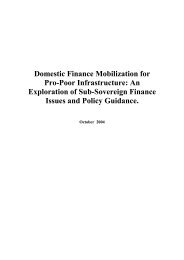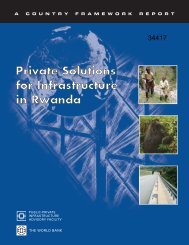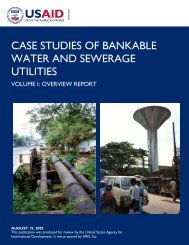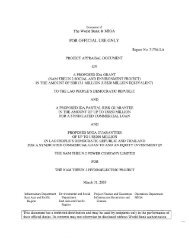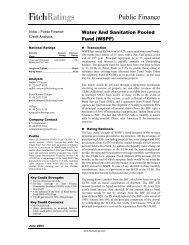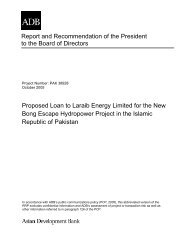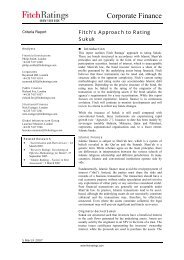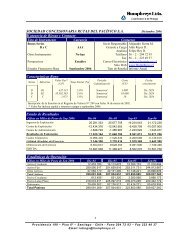EAP - The Pacific Infrastructure Challenge - World Bank (2006).pdf
EAP - The Pacific Infrastructure Challenge - World Bank (2006).pdf
EAP - The Pacific Infrastructure Challenge - World Bank (2006).pdf
You also want an ePaper? Increase the reach of your titles
YUMPU automatically turns print PDFs into web optimized ePapers that Google loves.
file tax returns. A corporatization strategy requires consistency between governance,<br />
tax treatment, accounting rules, corporate objectives and fiscal support for<br />
corporatized entities. Lack of coordination means that reforms intended to improve<br />
performance fail to achieve the desired results.<br />
A similar failure of policy coordination occurs when a country adopts a model of<br />
sector reform, but does not put in place the necessary conditions to make it effective.<br />
Fiji has adopted the ‘Landlord’ model for port operations, but contracts stevedoring<br />
operations out to a monopoly, government owned operator. This does not help to<br />
bring about the lower costs and improved efficiency expected from this reform.<br />
3) Inconsistencies between different aspects of sector policy: It is important to have consistent<br />
regulatory, competition, universal access and investment policies so that providers of<br />
infrastructure services – whether they are in the private or public sectors – have a<br />
clear and transparent business environment to work within.<br />
<strong>The</strong> expansion of rural electricity services in Vanuatu illustrates the problems which<br />
can occur where a consistent policy framework is not in place. Electricity services in<br />
the two main centers in Vanuatu are provided by UNELCO, a private firm.<br />
Government decided to expand service by inviting private providers to bid to serve<br />
two specified rural areas. <strong>The</strong> intention in holding a tender was to select the operator<br />
which could provide services at the lowest tariff. However, the way UNELCO was<br />
allowed to interpret the regulatory rules in its existing concessions meant that it could<br />
cross-subsidize the new rural concessions from its urban services. <strong>The</strong>re was no way<br />
for other firms to do this. UNELCO won the bid in part because of this ability to<br />
cross-subsidize.<br />
In a country with low capacity like Vanuatu, when an operator is working well, it may be<br />
smart to extend service by agreement with that operator, and to fund it through crosssubsidies.<br />
This would be a reasonable and coherent policy position. But what does not<br />
make sense is to implement a rural service policy based on competition, while having a<br />
regulatory policy which ensures that the competition does not take place on a level<br />
playing field. <strong>The</strong> service providers deserve to know what the rules are, and they should<br />
be consistent between all players. If they are not, then a government may find it difficult<br />
to attract investment in future. Allowing the perception to form in the minds of<br />
infrastructure operators that the policy framework is arbitrary or skewed in favor of the<br />
incumbent, is a sure and certain way to drive away the private sector, and fungible capital<br />
sources.<br />
4) Lack of coordination in development strategies across sectors: It is equally important to<br />
coordinate infrastructure development or expansion between sectors. Although some<br />
<strong>Pacific</strong> countries develop infrastructure master plans, our observation from visits to<br />
Fiji, Samoa and Kiribati was that the implementation of infrastructure development,<br />
upgrades and maintenance is often uncoordinated 15 . For example, it would make<br />
sense to try to coordinate maintenance or upgrades to water pipes and<br />
telecommunications lines, which are buried along the same stretches of road. This<br />
could also be coordinated with road works. This would optimize the labor and time<br />
spent digging up the same area several times in succession.<br />
Some countries outsource activities in more than one sector to private operators. In<br />
Fiji road maintenance and operation is performed by private operators, outer islands<br />
shipping services are operated under competitively tendered contracts, and the<br />
private sector also undertakes independent power production on a contract basis. In<br />
Samoa a number of port services, like stevedoring, are performed by private<br />
operators as is road construction and maintenance. Although these activities are very<br />
15 In the <strong>Pacific</strong> countries visited, Ministry personnel, utilities and private individuals all commented that capital<br />
works projects and general maintenance was uncoordinated and requires more focus.<br />
37



